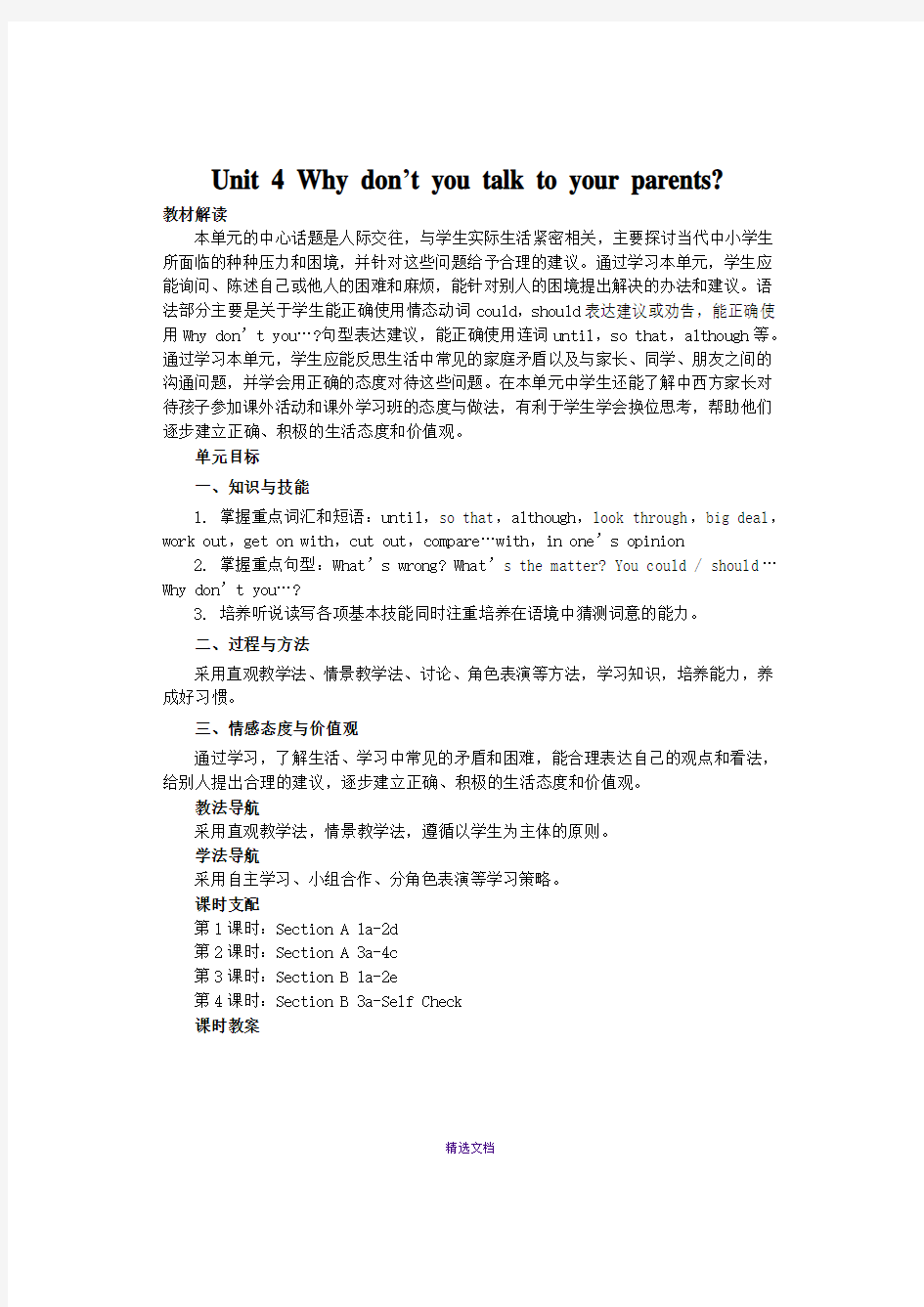人教版八年级英语下册unit-4教案

- 1、下载文档前请自行甄别文档内容的完整性,平台不提供额外的编辑、内容补充、找答案等附加服务。
- 2、"仅部分预览"的文档,不可在线预览部分如存在完整性等问题,可反馈申请退款(可完整预览的文档不适用该条件!)。
- 3、如文档侵犯您的权益,请联系客服反馈,我们会尽快为您处理(人工客服工作时间:9:00-18:30)。
Unit 4 Why don’t you talk to your parents?
教材解读
本单元的中心话题是人际交往,与学生实际生活紧密相关,主要探讨当代中小学生所面临的种种压力和困境,并针对这些问题给予合理的建议。通过学习本单元,学生应能询问、陈述自己或他人的困难和麻烦,能针对别人的困境提出解决的办法和建议。语法部分主要是关于学生能正确使用情态动词could,should表达建议或劝告,能正确使用Why don’t you…?句型表达建议,能正确使用连词until,so that,although等。通过学习本单元,学生应能反思生活中常见的家庭矛盾以及与家长、同学、朋友之间的沟通问题,并学会用正确的态度对待这些问题。在本单元中学生还能了解中西方家长对待孩子参加课外活动和课外学习班的态度与做法,有利于学生学会换位思考,帮助他们逐步建立正确、积极的生活态度和价值观。
单元目标
一、知识与技能
1. 掌握重点词汇和短语:until,so that,although,look through,big deal,work out,get on with,cut out,compare…with,in one’s opinion
2. 掌握重点句型:What’s wrong? What’s the matter? You could / should…Why don’t you…?
3. 培养听说读写各项基本技能同时注重培养在语境中猜测词意的能力。
二、过程与方法
采用直观教学法、情景教学法、讨论、角色表演等方法,学习知识,培养能力,养成好习惯。
三、情感态度与价值观
通过学习,了解生活、学习中常见的矛盾和困难,能合理表达自己的观点和看法,给别人提出合理的建议,逐步建立正确、积极的生活态度和价值观。
教法导航
采用直观教学法,情景教学法,遵循以学生为主体的原则。
学法导航
采用自主学习、小组合作、分角色表演等学习策略。
课时支配
第1课时:Section A 1a-2d
第2课时:Section A 3a-4c
第3课时:Section B 1a-2e
第4课时:Section B 3a-Self Check
课时教案
精选文档
第1课时Section A 1a-2d
教学目标
一、知识与技能
1. 能掌握以下单词:allow,wrong,guess,deal,work out
2. 能掌握以下句型:
①---W hat’s wrong?
---I’m reall y tried because I studied until midnight last night.
② You could give him a ticket to a ball game.
③ I think you should ask your parents for some money.
④ Why don’t you talk to him about it?
3. 能了解以下语法:
①能够运用所学知识谈论问题和困难、提出建议并作出选择;
②能根据对方所提出的问题,给出一些合理的建议。
二、过程与方法
采用直观教学法,情景教学法,小组讨论与交流来了解生活中、学习中常见的矛盾与困难以及提出合理建议。
三、情感态度与价值观
培养学生良好的合作意识,鼓励学生大胆表达自己的想法和意愿。正确认识生活中的一些困难,能采用正确的方式解决生活中的问题。
教学重点
掌握提建议的重点句型:You should / could… Why don’t you…?
教学难点
能对别人的问题提出合理建议。
教法导航
直观教学法,情景教学法。
学法导航
独立思考,小组讨论,合作。
教学准备
图片,多媒体。
教学过程
Step 1 Greetings
Greet the students as usual.
Step 2 Warming up
Show some pictures and ask:What’s the matter/ What’s wrong?
S:He has too much homework to do.
T:Does he like to do it?
S1:No,he doesn’t. Because he doesn’t have any free time to do things
精选文档
he likes.
精选文档
…
Step 3 Talking
Say:In our daily life there are always many problems. Look at these problems. Do you think they are serious or not? Students discuss with their partners and try giving some advice.
① I have to study too much so I don’t get enough sleep.
② I have too much homework so I don’t have any free time to do things I like.
③ My parents don’t allow me to hang out with my friends.
④ I have too many after-school classes.
⑤ I got into a fight with my best friend.
Step 4 Listening
T:Tell students to read the sentences in 1a again. Make sure they know the meaning of the sentences. Then play the recording for the students to listen and circle the problems they hear in 1a. Play the recording again. Check the answers with the students.
Step 5 Pair work
Ask a pair of students to read the conversation in the box. Then ask the students to work I pairs and use the information in 1a to make other conversations. Let some pairs act out their conversations.
Step 6 Listening
2a, Say:Peter has some problems. What advice does his friend give him? Fill in the blanks with could or should. Let students read the sentences in 2a. Play the recording for the students to listen and write the words in the blank. Play the recording again to check the answers.
2b, Let students read the sentences below. Explain some main sentences for the students. Make sure they know the meaning of each sentence. Play the recording for the students to write the letters (a-e) next to the advice in 2a. Play the recording again to check the answers.
Step 7 Pair work
Tell students to make a conversation using the information in 2a and 2b. Let one pair to read out their conversation first.
e.g. A:What’s the mat ter,Peter?
B:I had a fight with my best friend. What should I do?
A:Well,you should call him so that you can say you’re sorry.
B:But I don’t want to talk about it on the phone.
Students act the conversation in pairs. Ask some pairs to act out their conversations.
精选文档
